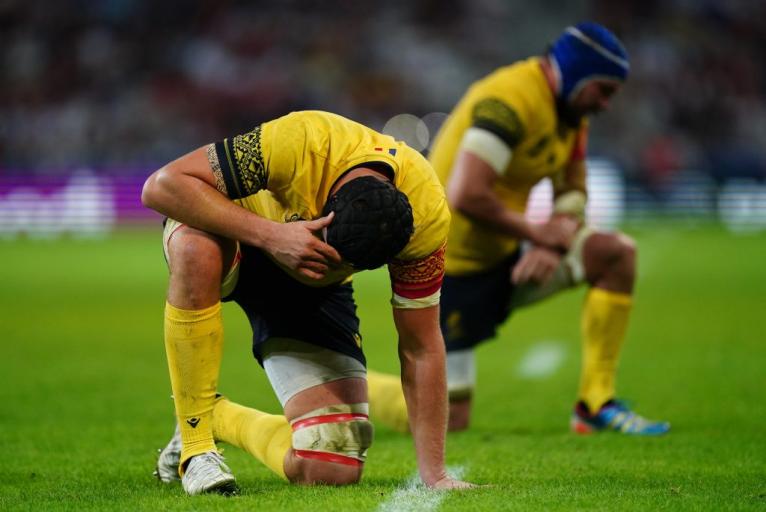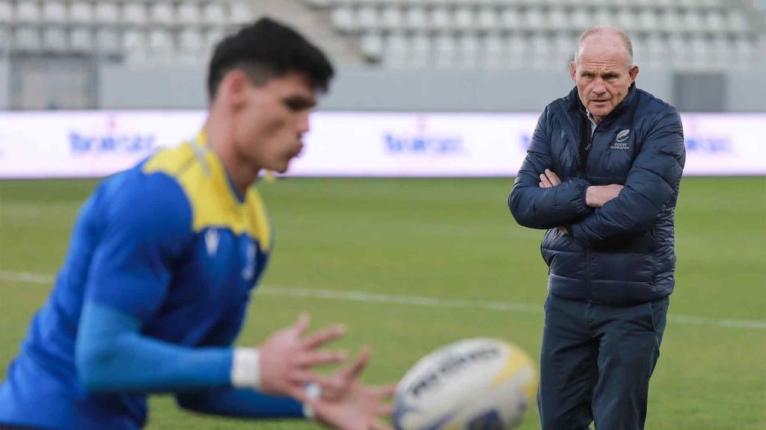If you have ever been to the Arcul de Triumf Stadium in Bucharest, you will have heard thousands of voices roaring in unison: “Stejarii! Stejarii!”, echoing passionate support for their team, Romania.
Stejarii translates to oak tree, a cherished symbol of the Romanian landscape, known for its resilience, resistance, and heaviness – all qualities found in Romanian rugby’s DNA.
The Stejarii have a long and memorable history which deserves to be properly told and remembered. Did you know they won the bronze medal in the Paris Olympics of 1924, when XVs was part of the Games programme? Did you know the Romanians defeated Wales, Scotland, and France back in the 1980s? There’s no shortage of impressive feats from the past, which makes the present even more disheartening.

Romanian rugby reached its peak in the 1960s and 1980s and didn’t miss a single Rugby World Cup until 2019, their nadir in the modern era. The Stejarii, Spain and Belgium were deducted points for fielding ineligible players during the qualification process. Not only did their senior squad begin to fray, but perhaps more distressingly, their age-grade teams foundered too.
Romania claimed a bronze medal in the 1996 Junior Rugby World Cup, beating France, Scotland and Italy along the way. For a significant period of time, they were one of the contenders for the U20 Rugby Europe Championship, which sits below the Six Nations, having won it in 2007 and 2008.
The monstrous physicality, thunderous carrying, and set-piece dominance slowly faded, leaving the Oaks unable to compete against their oldest rivals.
Alongside Georgia, Spain, and Russia, they were regarded as the best producers of young talent. That was until 2017, when Portugal upset the pecking order and won three championships in a row. Romania’s main issue was not simply failing to win the title, but seeing the Netherlands and Belgium overtake them. The Under-18s didn’t fare much better. Across the Romanian rugby community, alarm bells were ringing. The golden generation had become a mirage.
The monstrous physicality, thunderous carrying, and set-piece dominance slowly faded, leaving the Oaks unable to compete against their oldest rivals. This decline could have provided the spark for a new plan to reignite Romanian rugby. Instead, things have continued to unravel.
The road to the 2023 World Cup wasn’t plain sailing. The Oaks failed to qualify directly and were consigned to the repechage. Ultimately, Spain, again, used an ineligible player and Romania had their ticket to France.
The turbulence did not end there. Head coach Andy Robinson, who had signed with the union in 2019, mysteriously left his post in December 2022. The departure was never explained, and came as a shock, since Robinson had overseen some notable results. On his watch, Romania defeated Tonga and Uruguay, were unbeaten against Portugal, and even ran an Argentina side close in Bucharest. He finished with a respectable 50% win record.

Worse was to come. Eugen Apjok, prolifically successful in Romanian club rugby, took the reins and the Oaks suffered their worst season in 50 years, culminating in their poorest-ever World Cup performance. Along the way, there were brutal record losses to South Africa, Scotland, Ireland, Tonga, Portugal, Italy and Georgia.
All this against a backdrop of domestic sporting turmoil. A worrying number of Romanian football, handball and rugby clubs have entered administration or filed for bankruptcy, despite the country’s astonishing economic and social growth. Sport has failed to keep up with modern trends and make the necessary adaptations.
Romania’s top division recently underwent a serious makeover, downsizing from 15 clubs to five fully professional teams, with the rest occupying the amateur leagues below. The goal is to pit the best players against each other more often and drive the competition to new heights. It is a promising idea, but still in its infancy.
At least this bleak period does not appear to have dampened the Romanian people’s enthusiasm for rugby. Both of the Oaks’ home Rugby Europe Championship matches this month have been attended by over 6,000 people, displaying just the same passion as they did in the halcyon days of decades past.
But supporters are not blind to the troubles.
I don’t believe in the death of the Oaks. I’ve heard it before but our roots go deep.
In a recent poll conducted in Sport4life Rugby Mania regarding the state of Romanian rugby, 30% claimed the government is responsible for the depressing situation, followed by the union (22%) and the local clubs (11%).
“Succinctly I think it’s a mix of the above,” says Bodgan Celea, member of the Romanian fan community Club 16 Horia Ungur.
“The government not only didn’t invest in the sport but also has expropriated the Arcul de Triumf stadium, which means the Oaks are guests in their own home. There’s a lack of rugby infrastructure in our country, and that is one of the biggest issues if it wants to grow.
“The Romanian union has limited options, but they still could do better in the youth teams and the development sector. The clubs didn’t help either, failing to have a true path for their youth. Our competitors have become stronger, and are better than us in the youth competitions and in exploiting the eligibility rules.
“Romania does a good job bringing in players from abroad, but we do not have the same depth of eligible players as Portugal and Spain. We need to push for a more competitive mindset in our local youth tournaments.
“I don’t believe in the death of the Oaks. I’ve heard it before but our roots go deep. We just need to take better care of them.”
As Celea notes, the Romanian footprint in the coveted French scene has shrivelled, while Georgia, Spain and Portugal grow their cohort of talent playing in some of the best club competitions in rugby.
“The situation in Romanian sports isn’t good,” says Mihai Macovei, a giant of Romanian rugby with over 100 caps to his name. “Unfortunately, the government has been leaving investments in sports on the back burner. I also think something needs to be changed at the Romanian Rugby Union, as we need another plan made for the future, one that has the direct involvement of the Sports Ministry.
“I’m sure it hurts to see Romania concede almost 50 points at home against Portugal and 200 points at the World Cup, but I still have hope and believe that with a deep restructuring in the coming years, something can change.”
 Mihai Macovei has long been a totemic presence in the Romania pack (Photo by Vasile Mihai-Antonio/Getty Images)
Mihai Macovei has long been a totemic presence in the Romania pack (Photo by Vasile Mihai-Antonio/Getty Images)
Apjok followed Robinson out of the exit door after the World Cup. David Gérard took his place and must now haul the Oaks back to their feet, restore the feelgood which has been missing for an age.
“We have to believe that we can change the future,” the former France lock said at his media unveiling. “I have a lot of faith in what we can do for Romania.”
Still, the Stejarii faithful sing of their glory, their history, and their undying love for Romania. The memory of the 1924 Olympic team burns bright, and has been widely celebrated by fans, players and clubs. What better way to pay homage to those legends of 100 years ago than by waking from this deep slumber?


Romania should try to have a cross border cup competition with Italian club teams. Both need to up their levels of competition. However, pathways are the key to success. World Rugby can and should expand its World Rugby U20 Trophy competition to sixteen teams. A Nations Cup for the national team in Bucharest, like they used to have. And I think they have a team in Europe Super Cup. Schools, Universities are great learning centres for everything, including Rugby, its the way Ireland is set up, and look at their success. Of course its difficult to achieve anything without financial help and government support. Again World Rugby can liase on this and propose a plan to backers that moves Romania Rugby forwards.
WR should be sending major development funds in to these Tier 2 (3 ?) nations and not lining the tweed pockets of the gin swillers in Dublin.